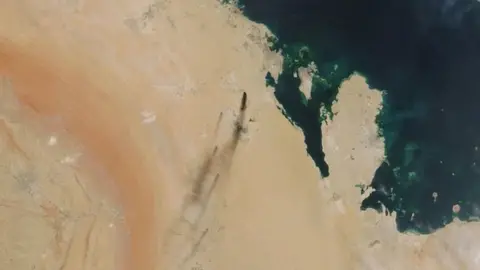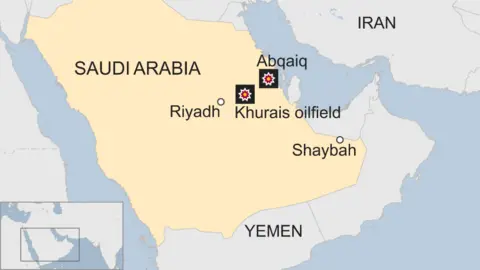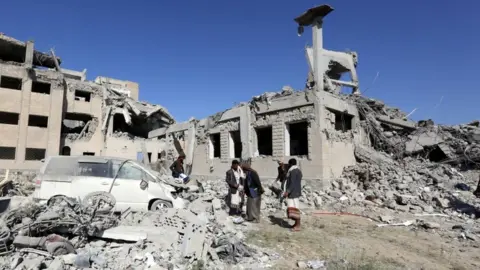Saudi oil attacks: Iran condemns US 'deceit' after accusation
Iran has accused the US of "deceit" after Secretary of State Mike Pompeo said Tehran was behind damaging drone attacks on two Saudi oil facilities.
Mr Pompeo had rejected claims by Yemen's Iran-backed Houthi rebels that they had carried out the attacks.
Iran's Foreign Minister Javad Zarif said that "blaming Iran won't end the disaster" in Yemen.
Saudi Arabia said Saturday's strikes had suspended the production of 5.7 million barrels of oil a day.
All eyes will be on the markets when they reopen on Monday, with experts expecting a significant rise in price.
Meanwhile on Sunday evening US President Donald Trump said he had authorised the release of oil from the Strategic Petroleum Reserve if needed, "in a to-be-determined amount sufficient to keep the markets well-supplied".
Since ousting Yemen's president in 2015, the Houthis have been fighting a Saudi-led and Western-backed coalition.
They said they had deployed 10 drones to attack the Abqaiq processing plant and the Khurais oilfield early on Saturday.
But Mr Pompeo said there was "no evidence" the drones came from Yemen and instead accused Iran.
The US has blamed Iran for other attacks on oil supplies in the region this year, amid continuing tension following Mr Trump's decision to reinstate sanctions after abandoning the landmark international deal which limited Tehran's nuclear activities.
What has Iran said about the US accusations?
Mr Zarif took to Twitter to deride the US secretary of state, saying that "having failed at max pressure, Sec Pompeo's turning to max deceit".
He was referring to the Trump administration's stated "maximum pressure campaign" which has targeted Iran with sanctions.
 NASA
NASAMr Zarif said the US and its allies were "stuck in Yemen because of the illusion that weapon superiority will lead to military victory".
"What is happening in the region today, which has also worried the world, is in fact because of the wrong policies adopted by the US and the plots hatched by the country," he said.
Iranian President Hassan Rouhani has said prevention of US "aggression" is the only way to ensure regional security.
What's behind Mr Pompeo's claims?
The US secretary of state gave no specific evidence to back up his accusations, simply saying: "We call on all nations to publicly and unequivocally condemn Iran's attacks."
The US would work with its allies to ensure "Iran is held accountable for its aggression", he said.
The US has previously accused Iran of attacks on two oil tankers in the Gulf in June and July, as well as on another four in May. Tehran rejected the allegations in both cases.
If the Houthi rebels had deployed the drones from Yemen, they would have to have flown them hundreds of miles.
However, one element of the Houthi statement on the attacks did thank "co-operation with the honourable people inside the kingdom".
The distance from the nearest point on the Yemen border to the closest target, the Khurais oilfield, is about 770km, well beyond the range of the normal Houthi attack drone, the Qatef-1.

However, UN investigators have highlighted the existence of a new Houthi drone, the UAV-X, which could reach up to 1,500km.
The Wall Street Journal has said experts are also investigating whether the attacks could have been carried out from the north - either by Iran or its Shia allies in Iraq - using cruise missiles rather than drones. If so, it seems unlikely they would have escaped detection.
On Sunday, Iraq's Prime Minister Adil Abdul-Mahdi denied "what is circulated on social media networks that its territory was used to attack Saudi oil facilities with drones".
The Washington Post newspaper said the US government believed that 15 buildings at Abqaiq had been damaged on the west-northwest sides, not the southern sides facing Yemen.
What is Saudi Arabia doing about supplies?
The Saudis have not gone into any detail about the attacks, barring saying there were no casualties, but have given a few more indications about oil production.
Energy Minister Prince Abdulaziz bin Salman said some of the fall in production would be made up by tapping huge storage facilities.
Saudi stocks stood at 188 million barrels in June, according to official data. The kingdom is the world's biggest oil exporter, shipping more than 7 million barrels daily.
Experts say these could be used for several weeks, although that may well also be the time it takes to get production back to normal.
The Tadawul All-Shares Index lost 200 points - about 3% - when it opened on Sunday, but had checked the fall to about a 1% loss by mid-afternoon.
Why would the Houthis attack Saudi Arabia?
Yemen has been at war since 2015, when President Abdrabbuh Mansour Hadi was forced to flee the capital Sanaa by the Houthis. Saudi Arabia backs President Hadi, and has led a coalition of regional countries against the rebels.
The coalition launches air strikes almost every day, while the Houthis often fire missiles into Saudi Arabia.
Houthi military spokesman Yahya Sarea said on Saturday that operations against Saudi targets would "only grow wider and will be more painful than before, so long as their aggression and blockade continues".
 EPA
EPAHe said Saturday's attack was one of the biggest operations the Houthi forces had undertaken inside Saudi Arabia.
